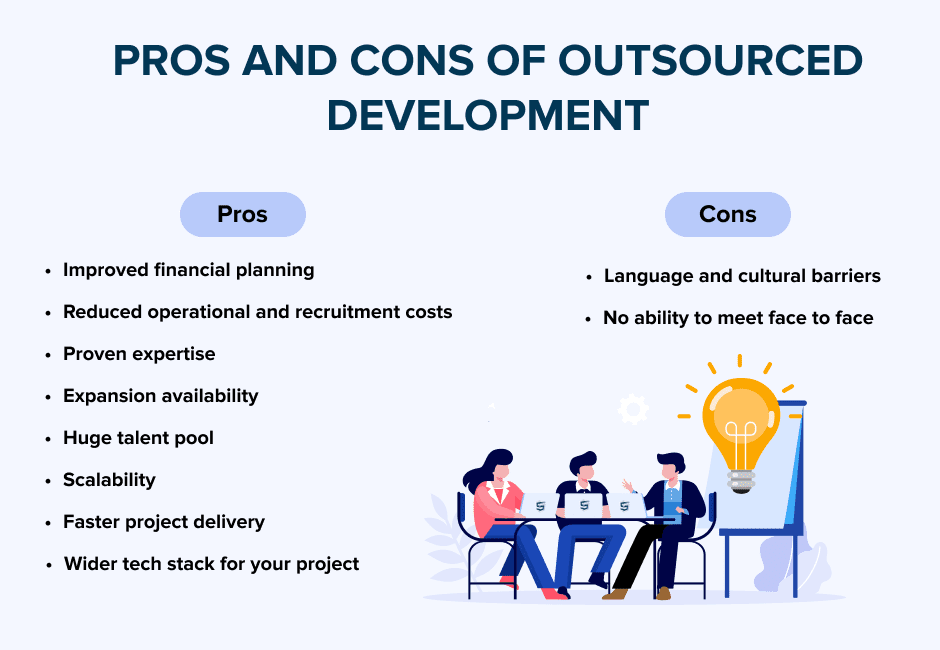Outsourcing vs In-house Development: Pros and Cons


Gone are those times when companies were relying on their internal resources only for various technical tasks implementation. As the world faced globalization, and collaboration & sharing values started to grow as trends in business strategy, more and more companies moved to tasks outsourcing. What made companies resort to extra help from the outside? Some companies were lacking human resources possessing special knowledge and skills to work on a project, other crews were in need of additional resources with specific knowledge, and the rest were trying to make the development process cheaper and faster. For example, a bespoke software development company can meet all the needs a product company might have without the hassle of creating a whole new division and hiring new employees. And there are countless more examples like that.
Today people tend to delegate their tasks to outsource companies in many spheres of life & business including accounting, telemarketing, etc. That is why we decided to write an article about in-house vs outsourcing development.
Software development outsourcing has become a very convenient way to subcontract massive and/or urgent issues to companies with a ready-to-start development team and various strategies prepared. There are thousands of software outsourcing companies located all over the globe, so the hiring companies do have plenty of choices, and in-house development vs outsourcing is a thorny issue.
1. Why some companies are doubtful about outsourcing
Reduced costs and availability of resources are the major advantages of outsourcing. So, why do some companies never ask a question about in-house vs outsourcing development and hire an in-house team? Here are some reasons why some companies give up on the idea of subcontracting their IT development tasks:
1. Some companies simply have negative outsourcing experiences from the past.
After delegating once the specified responsibility to an outsourced development team and receiving negative effects from it, it’s most likely that the company will never resort to outsourcing again, believing that all outsourcing companies share the same working strategy and business approach, which is not true;
2. Some companies want to have 100% control over the project.
They don’t want to let other people from other companies, countries, and even continents into the important details. In most cases, this concerns the development of innovative products and systems when the non-disclosure means much and in-house vs outsourcing development is not a topic of discussion;
3. Some companies are afraid of hidden costs outsourcing may bring.
These companies are sure that there is no such thing as a free lunch, so they are often put off by unbelievable advantages, willing to find the pitfalls;
4. Some companies are just fully satisfied with their in-house development team.
The in-house team of developers is implementing its tasks on time and introduces good work, so there is no need to look for extra help from the outside. Also, when you have calculated your labor cost percentage and know your business is doing well with your in-house professionals.

2. When to use outsourcing software development
So, taking into consideration the profound global experience and feedback from numerous companies that were lucky to obtain qualified help from a 3rd party company, we’d like to provide you with a brief comparison of in-house development vs outsourcing pros and cons.

2.1 Pros of outsourced software development
| Advantage | Details |
|---|---|
Improved financial planning
|
It lets you know the exact cost of the functions and services during the development. There are many outsourcing companies that offer affordable prices all over the world. Thanks to a large number of talents, low tax rates, and government support for the IT sector, Eastern European development companies have become very popular. Reduced operational and recruitment costs The necessity to hire individuals is excluded, so besides money-saving, there is the advantage of time-saving |
Reduced operational and recruitment costs |
The necessity to hire individuals is excluded, so besides money-saving, there is the advantage of time-saving |
Proven expertise |
As a rule, the tasks are subcontracted to the vendors who narrowly specialize in a given area or field. The outsourcing company has a huge development team, so there are more options to choose from, starting from the level of experience and finishing with other professional characteristics |
Expansion availability |
Software outsourcing helps companies expand their activities in the market, enter new market areas by taking the point of production or service delivery closer to their end-users. |
Huge talent pool |
The IT outsourcing market provides a large number of technical experts with deep knowledge and experience. That is why in in-house development vs outsourcing the second can provide you with unlimited recruitment opportunities. As a result, the recruitment process may only take a few days instead of months. |
Scalability |
If you need to speed up the software development process or reduce the number of experts when there are no dev tasks, you can change the size of your outsourced team. |
Faster project delivery |
Outsourcing software development allows you to cut time to market thanks to scalability options. |
Wider tech stack for your project |
You don’t have to limit your project tech stack to the expertise of the developers you have direct access to. You can choose the best option for your specific business requirements and plans. |
2.2 Cons of software development outsourcing
| Disadvantage | Details |
|---|---|
Language and cultural barriers |
In most in-house vs outsourcing cases, companies outsource to companies located in other countries. Still, this disadvantage is not that serious, because the use of the global communication language (which English is) is well-spread; |
No ability to meet face to face |
Being located on different continents makes regular meetings a hard, though not impossible, task. |

2.3. Companies with outsourced software development teams
There are several examples of companies outsourcing their software development and reaping considerable benefits.
- PayPal
- Toyota
- Xerox
- Slack
- Beiersdorf
If you want to create high-quality products at a reasonable price when choosing between in-house development vs outsourcing, the second option can become a good solution.
3. In-house software development
3.1. Pros of In-House software development
| Advantage | Details |
|---|---|
Cultural fit |
Developers who are permanent members of the in-house team tend to pay more attention to the specific needs of the company. This means that in-house developers are motivated to achieve the best results and bring as much value as possible. Internal developers can more easily integrate with your company’s culture. |
Face to face communication |
Members of the in-house team have the same working hours and being in an office can make the communication process more comfortable and clear. Direct dialogue helps avoid misunderstandings and increases efficiency. |

3.2 Cons of in-house development
| Disadvantage | Details |
|---|---|
Loss of employees |
Software developers tend to change the workplace frequently. As a result, you may face some labor challenges and waste time. Finding new developers for an in-house team is always time-consuming, so your project development may stop or slow down for a while |
High cost |
Internal development is much more expensive than working with suppliers. The final price consists of many expenses, such as rent, taxes, software, hardware, etc. here are some additional expenses, such as training employees, sick leave, and benefits for team members. |
Lack of technical talent |
The growing IT market has created an overwhelming demand for technical experts. It has been difficult to hire the right people in certain areas. |
3.3. Companies with in-house software development teams
There are some examples of companies that prefer in-house software development to outsourcing.
- Amazon
- Salesforce
To sum up, due to the difficulty of hiring suitable employees, internal development may require more time and resources. However, you may prefer to hire an in-house development team for long-term cooperation rather than looking for an outsourced team.
4. In-house VS outsourcing – what to choose?
There is no right answer in the dispute between in-house vs outsourcing development because it all depends on several factors people and companies back on while making such kinds of decisions. You would better choose outsourcing in case of:
- The insufficient level of proficiency of the developer on-site. Sometimes experts in technology/language are lacking, so the company can resort to outsourcing the task to some other company that has enough experts with the skill set required;
- The lack of time left before the planned product delivery date. In cases when there is no time that can be spent on the search for an applicable candidate and his integration into the in-house team, the best option could be outsourcing;
- The importance of rapid sharing and collaboration on the project, the meaning of the feedback, and its influence on the success of the project.
Using outsourcing custom development services you can win more advantages because of saving time and having all the management issues easily dealt with by professionals.

4.1. When To Use In-House Development?
Despite the seemingly high cost, there are still good reasons to build an in-house team when you choose between in-house vs outsourcing development.
- You have no budget constraints.
- You need to have complete control over the development team.
- You have all the necessary expertise to manage an IT team in-house.
4.2. When To Use Outsourced Development?
If you have the following business requirements and limitations, outsourcing development is the better option.
- Have some budget constraints.
- You cannot find available talent to hire locally.
- You have tight launch deadlines.
- You don’t know how to manage an IT department.
5. How to outsource without fail?
Outsourcing your software development requires some preparation and market investigation. Therefore, we decided to name some pitfalls you can face.
- Quality development cannot be too cheap.
Definitely, developers in Eastern Europe and Asia are cheaper than in the USA. However, choosing too cheap developers can be tricky and risky as today software developers with decent experience and level of expertise have rather good wages. You won’t be able to find a 10$/hour senior developer in Belarus, for example, taking into account that salaries in the region start at 3K. To understand the real level of hourly rates, you can make a quick overview of salaries in the region.

2. Research previous experience & feedback
When you want to hire a software outsourcing company, first check the case studies, references, and their reputation (at least, a quick online check). Every reliable developer tends to show the projects that have been released, for example, you are welcome to browse SumatoSoft’s case studies.
3. Protect your data
An NDA agreement must be signed to protect your idea and any development process even before the first call with a company’s representatives. In addition, the contract should contain information about the process of data collection, transmission, and access.
4. Check transparency
Software development companies should ensure transparency of their processes and actions from the very first call. They should show, explain and prove everything they say or show. During the development process, such transparency is ensured through regular and clear communication and project management tools setup (e.g. Jira, Trello, etc).
6. Conclusion
When comparing in-house vs outsourced software development, we can clearly see that most business owners should opt for outsourced development services due to the multitude of benefits and opportunities it offers.
However, the development In-house may become the right choice if you are sure about your IT management and the company has enough money and time to build an in-house development team. The main cons of in-house software development are the high costs of development and the lack of experts in certain areas.

7. Why hire software developers at SumatoSoft?
SumatoSoft is headquartered in the USA, Boston. Our development center is located in Eastern Europe (Poland and Belarus) and works with highly qualified developers.
There are 5 main reasons for outsourcing your project development to our company:
- We have a very thorough process of talent hiring. We check their hard and soft skills and test and train them for recent technologies knowledge. We don’t hire the cheapest candidates, but the best ones.
- We have processes of knowledge sharing that ensure that the developers’ changes won’t affect your project.
- Our developers and project managers speak English (some even speak German, Polish and Spanish), so the communication process is easy and comfortable. We are aimed to become a reliable outsourcing partner.
- If we are in different time zones, our development team builds the process in such a way that you and the team will be updated according to the schedule convenient for you.
- And, finally, we’re definitely cheaper than hiring, for example, local developers in-house. But not too cheap as we do deliver value.
Get in touch with us and we’ll prove to you that we know how to build the software that will change your business.
Let’s start
If you have any questions, email us info@sumatosoft.com



